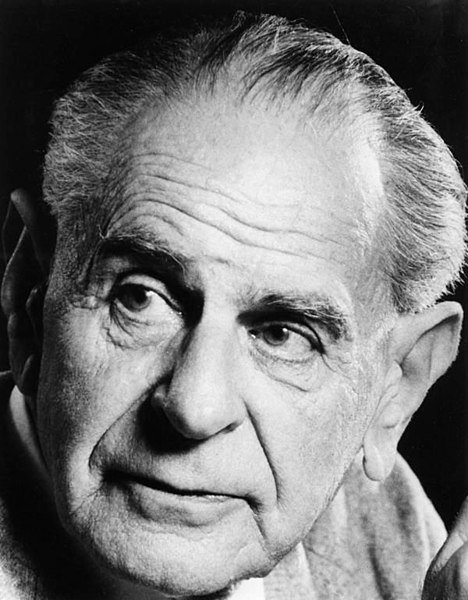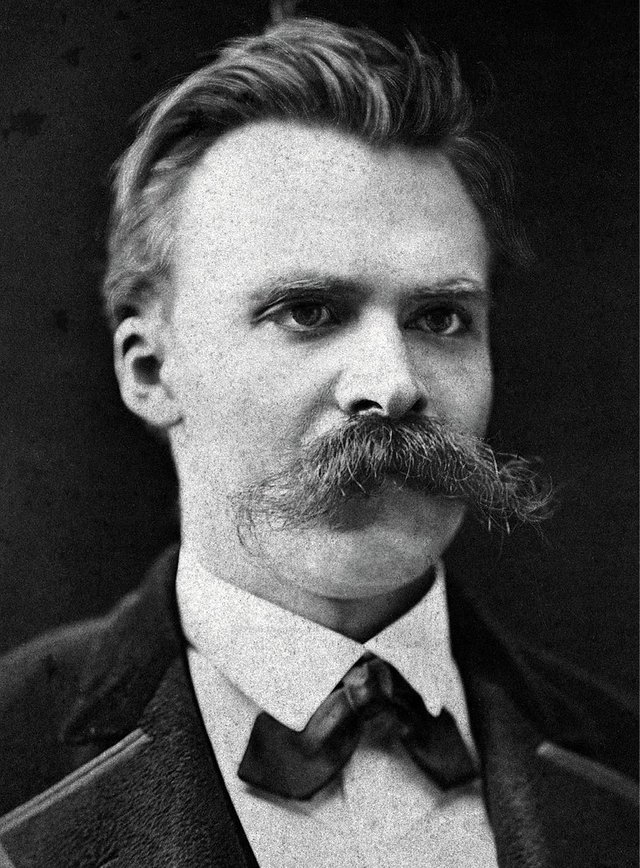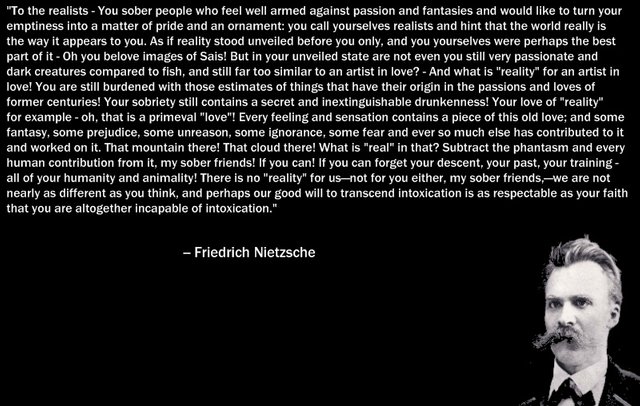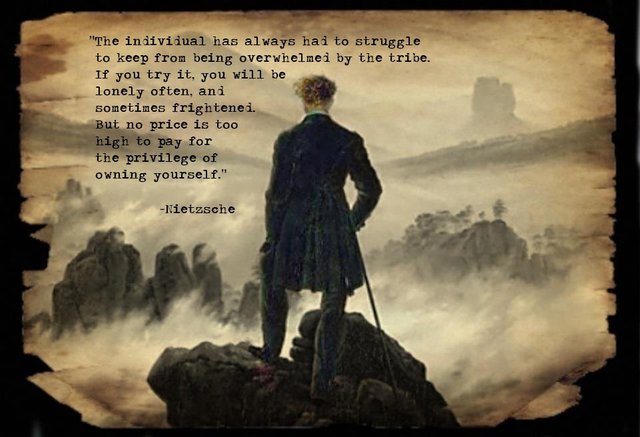Extra-Curation #6: Exploring Wikipedia on Philosophy, War, History, Metaphysics and Getting Rid of The Myths Planted in You Mind
in this age of information, knowledge is all around us. But that doesn't mean people will discover all that knowledge. Internet has only improved the accessibility and distribution. You can't just force feed people information and we still have to work to dig out accurate and valuable information. Wikipedia has been a part of the Alexa Top 10 for a very long time. It's one of the biggest and most popular websites ever made and and not a single penny was spent on a marketing campaign to promote Wikipedia. the project was built and people came.
But still there is the problem of finding worthwhile information to expand your understanding. To keep things shorter and more focused i decided to share a collection if interesting Wikipedia pages that belong o various people from vaious sides of life. Let's begin........ With a Long Read
Sir Karl Raimund Popper
He has been awarded Order of the Companions of Honour, Fellowship of the British Academy , Fellowship of the Royal Society and he was Knighted by Queen Elizabeth II in 1965. He is a philosopher but not one of those people who just spend their time thinking and then rambling about their thoughts. Karl Popper actually tried to philosophize in ways that it was useful. He genuinely tried to add value to the world and contribute to the knowledge base of humanity. Lucky for us he lived 92 years and here are some of his contributions to the world of logic, philosophy and ideas. For extended insights visit https://en.wikipedia.org/wiki/Karl_Popper
- Bold hypothesis
- Critical rationalism
- Falsificationism
- Demarcation problem
- Evolutionary trial and error view of the growth of knowledge
- Propensity interpretation
- Open society
- Cosmological pluralism
- Modified essentialism
- Axiomatization of probability
- Active Darwinism
- Spearhead model of evolution
- Objective hermeneutics
- The paradox of tolerance
- Critical dualism (of facts and standards)
- Logic of scientific discovery
- Experimental corroboration as an indicator of verisimilitude/truthlikeness
- Basissatz (basic statement)
- Popper's experiment
- The historicism–historism distinction
- Negative utilitarianism
Anthony Swofford
https://en.wikipedia.org/wiki/Anthony_Swofford
You can thank this guy for being a U.S. Marine in the Persian Gulf War and writing a memoir that gave us a Sam Mendes movie (also a flop like Green Zone) that make Skyfall look like a second rate movie by an upcoming director. The Book & The Movie are both named Jarhead and it's a great illustration of what it means to be a part of the military and the war machine and the after effects of it. There is a very important part about this movie that can spoil you a lot of intensity. So please skip the next sentence if you haven't seen the movie or the book. Anthony Swofford never fired his rifle at an enemy.
Anthony Swofford's memoir will will you with a journey of frustration and disappointment. I've never served in a military and I never will. But if you want to serve, maybe you should see it through the eyes of someone who actually (not) went through it. Why the "(not)"? Well that's a spoiler.
Anthony Swofford's father had served in the Vietnam War, and before that his grandfather had fought in World War II. Swofford wanted to join the Marines and he considered it as "an entry into manhood". But the father was actually against it and end up telling his son:
"I know some things about the military that they don't show you in the brochures."
I'd say you could say the same about most books and movies about the war. But Jarhead isn't one of them. Swofford doesn't tell that the war is hell. He doesn't make the military look fun. What his work shows is how war makes a man hollow and how so much work and patience and waiting ends up amounting to nothing. [See the spoiler in small text.]
Further Spoilers:
Friedrich Nietzsche
You think you now Nietzsche? Most probably you have missed the point. Here is an analysis I made 8 months ago on The Myth of the Nihilist Nietzsche. Give it a read and then give https://en.wikipedia.org/wiki/Friedrich_Nietzsche a visit. You'll realize that you have too much second hand knowledge on Friedrich Nietzsche and that knowledge is somewhat distorted from what he was actually trying to say. i repeat; Friedrich Nietzsche is NOT a nihilist.
In
Thus Spoke Zarathustra,Nietzscheproclaims that a table of values hangs above every great person. He points out that what is common among different peoples is the act of esteeming, of creating values, even if the values are different from one people to the next.Nietzscheasserts that what made people great was not the content of their beliefs, but the act of valuing. Thus the values a community strives to articulate are not as important as the collective will to see those values come to pass. The willing is more essential than the intrinsic worth of the goal itself, according toNietzsche.
What if I replaced those crossed out words with content that would make the quote look like it belongs to an Austrian Economist? It seems completely doable. Does this kind of thinking and statements look like a black hole of nothingness?
To be "good" was to be happy and to have the things related to happiness: wealth, strength, health, power, etc. To be "bad" was to be like the slaves the aristocracy ruled over: poor, weak, sick, pathetic—an object of pity or disgust rather than hatred.
Did you think that these would be the words of Nietzsche? I've got even more surprises in case you've been gaslighted
by the mainstream ramblings and second had derivative perceptions. The truth ws out there for billions to read on a top 10 Alexa site. You just had to do the actual reading.
Nietzsche sees the slave-morality as a source of the nihilism that has overtaken Europe. Modern Europe and Christianity exist in a hypocritical state due to a tension between master and slave morality, both values contradictorily determining, to varying degrees, the values of most Europeans (who are "motley"). Nietzsche calls for exceptional people to no longer be ashamed of their uniqueness in the face of a supposed morality-for-all, which he deems to be harmful to the flourishing of exceptional people. He cautions, however, that morality, per se, is not bad; it is good for the masses, and should be left to them. Exceptional people, on the other hand, should follow their own "inner law". A favorite motto of Nietzsche, taken from Pindar, reads: "Become what you are."
I teach you the overman. Man is something that shall be overcome. What have you done to overcome him?... All beings so far have created something beyond themselves; and do you want to be the ebb of this great flood, and even go back to the beasts rather than overcome man? What is ape to man? A laughing stock or painful embarrassment. And man shall be that to overman: a laughing stock or painful embarrassment. You have made your way from worm to man, and much in you is still worm. Once you were apes, and even now, too, man is more ape than any ape... The overman is the meaning of the earth. Let your will say: the overman shall be the meaning of the earth... Man is a rope, tied between beast and overman—a rope over an abyss ... what is great in man is that he is a bridge and not an end.





@smartbot tip 1
Your post has been tweeted to 2000 followers. Follow me on twitter
Your post has been shared with 2000 facebook members. Join facebook group
Σ$$$ Tipped @vimukthi
Σ1 SMART! Comment@smartbot helpto claim. Currently the price of SmartCash in the market is$0.071 USDperSMART. Current value of the tip is$0.07 USD. To find out more about SmartCash, please visit https://smartcash.cc.Your post has been resteemed. Thank you for using my resteem service
Join my discord server for free resteems